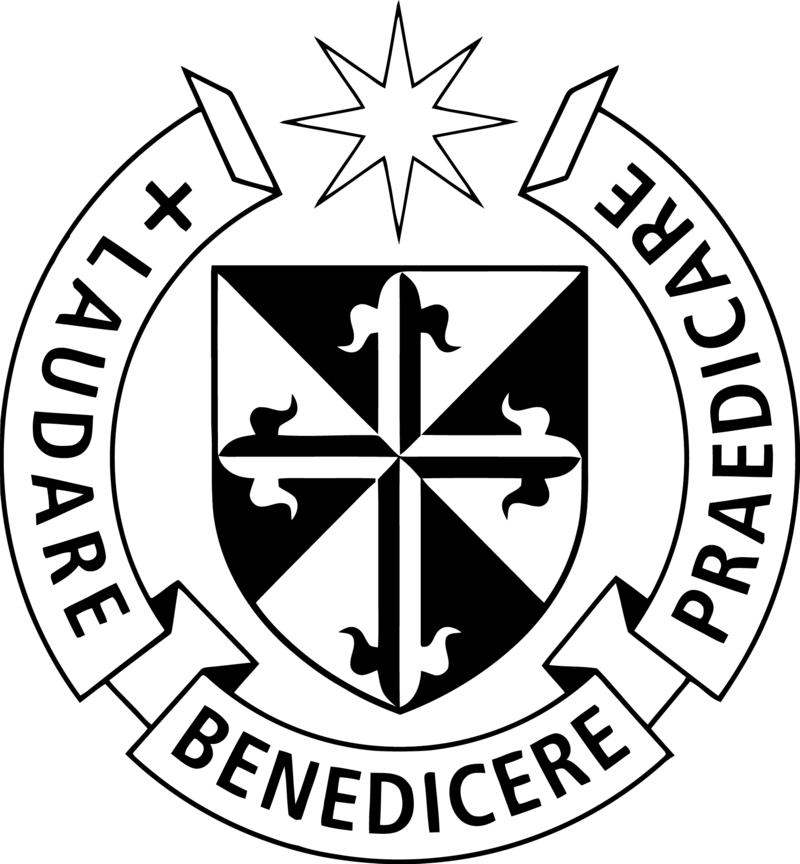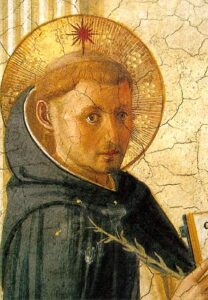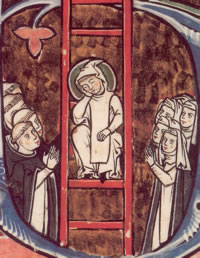Origine de l’Ordre
Au début: Dominique de Guzman
À l’origine des Frères Prêcheurs, il y a Dominique de Guzman.
L’homme évangélique, ainsi que le qualifie Jourdain de Saxe dans son Petit livre sur les origines de l’Ordre. Qui était-il? Pourquoi a-t-il fondé cette communauté à laquelle il a lui-même donné le nom de Frères Prêcheurs et qui, par la suite, sera désignée couramment à partir de son nom: les Dominicains?
Saint Dominique ne nous a laissé aucun écrit où nous pourrions trouver une réponse à ces questions. Il nous faut donc questionner les chroniques qui nous parlent de lui et ce que l’histoire nous dit de son époque, le Moyen Âge. Alors se dessinent sous nos yeux les traits d’un homme qui n’aspire qu’à une seule chose: imiter Jésus Christ. Un homme, nous disent les témoins, qui ne parlait qu’avec Dieu ou de Dieu. En même temps, Dominique se révèle comme un homme solidaire d’un monde en plein bouleversement; un monde qu’il aime et veut embraser du feu de l’Évangile qui le consume lui-même. C’est au terme d’une longue recherche du dessein de Dieu, tel qu’il l’a lu dans les événements qui ont jalonné sa vie, que Dominique fonde l’Ordre des Prêcheurs.

Un monde bouleversé
 Saint Dominique naît vers 1170 dans le bourg de Caleruega, en Espagne. La société médiévale dans laquelle il va vivre et oeuvrer pour l’Évangile est alors en pleine transition. Celle-ci est d’abord causée par l’une des plus importantes explosions démographiques de l’histoire, accompagnée d’un vaste mouvement d’urbanisation. Dans le système féodal les activités telles le commerce et la politique se déroulaient autour des châteaux des seigneurs ou des abbayes. Maintenant, tout cela se déplace vers les villes qui deviennent les pôles de l’activité politique et économique, alors qu’auparavant elles n’étaient que des lieux de peuplement.
Saint Dominique naît vers 1170 dans le bourg de Caleruega, en Espagne. La société médiévale dans laquelle il va vivre et oeuvrer pour l’Évangile est alors en pleine transition. Celle-ci est d’abord causée par l’une des plus importantes explosions démographiques de l’histoire, accompagnée d’un vaste mouvement d’urbanisation. Dans le système féodal les activités telles le commerce et la politique se déroulaient autour des châteaux des seigneurs ou des abbayes. Maintenant, tout cela se déplace vers les villes qui deviennent les pôles de l’activité politique et économique, alors qu’auparavant elles n’étaient que des lieux de peuplement.
Cette urbanisation fait naître, à côté de la noblesse et des clercs, une nouvelle classe sociale: la bourgeoisie. Importante par l’argent qu’elle acquiert du commerce, cette bourgeoisie marchande dirige la ville. Seigneurs locaux, souverains et gens d’Église doivent maintenant compter avec elle, parce que c’est elle qui peut fournir l’argent nécessaire au maintien des armées ou au financement des constructions.
Mais cet accroissement de la population et cette urbanisation n’apportent pas la prospérité à tous; la pauvreté est le lot commun. La majorité des gens ne dispose que du minimum pour vivre, leur situation contrastant scandaleusement avec celle de la noblesse féodale et de la bourgeoise. De plus, les épidémies et surtout les famines frappent durement les populations; des hommes libres redeviennent des serfs pour assurer leur subsistance.
En même temps, on assiste à l’émergence d’une conscience nationale chez les Anglais, les Français, les Espagnols et les Allemands. Leurs souverains respectifs sont en train de constituer leur royaume sur cette base nationaliste.
L’Église n’échappe pas à ce mouvement de transformation. Jusque là, sa vie gravitait autour des abbayes. C’étaient presque les seuls lieux où l’on pouvait recevoir une formation intellectuelle poussée, et où l’on pouvait recruter des clercs assez instruits pour en faire des évêques.
Désormais, les écoles passent des abbayes aux cathédrales, donc au centre des villes. Au début, les écoles cathédrales ne dispensent qu’un enseignement théologique pour les clercs des diocèses. Mais rapidement, elles prennent de l’expansion et s’ouvrent à un plus grand nombre pour offrir un enseignement couvrant toutes les sciences de l’époque (grammaire, rhétorique, mathématiques, philosophie) et donner naissance aux universités.
Au temps de saint Dominique, les plus célèbres sont celles de Bologne et Paris. À l’image des commerçants bourgeois qui s’organisent en corporations, relevant de l’autorité royale, les universités s’organisent en corporation relevant de l’autorité du pape.
Malgré cela, le bas clergé, curés de paroisses et chapelains, reste majoritairement sous-instruit. Généralement, ces prêtres ne savent ni lire, ni écrire car, issus de milieux pauvres, ils n’ont pu étudier. Ayant appris par coeur les textes d’une messe et l’évangile correspondant, ils les répètent inlassablement Quand ils prêchent, ce n’est pas sur l’Évangile, mais sur un sujet de morale. Paradoxalement, I’Europe est chrétienne, mais non évangélisée.
Ceux qui peuvent corriger cette situation, ce sont les évêques. Mais ils sont le plus souvent accaparés par l’administration des fiefs qui leur sont confiés par les rois. Àl’origine, ces domaines leur avaient été donnés pour assurer des revenus aux diocèses. Avec le temps, ces domaines devenant parfois très importants, les évêques se voient considérés par les souverains comme des seigneurs, au même titre qu’un comte ou un baron, et ils se mettent à agir comme tels. L’Église, en fait la papauté, appuyée par quelques évêques et parfois quelques souverains, tente de corriger cette situation.
Son arme principale est la constitution de chapitres de chanoines dans les cathédrales. II s’agit de prêtres vivant en communauté autour de l’évêque dans la pauvreté. On donne à ces chapitres la Règle de saint Augustin, qui insiste beaucoup sur la vie communautaire et la pauvreté en proposant l’exemple de la vie de l’Église primitive, telle que décrite dans les Actes des Apôtres. A long terme, on espère que ces chapitres deviendront des pépinières d’évêques qui se conduiront davantage selon l’idéal évangélique que selon celui de la noblesse féodale.
Mais ce travail de correction est lent et de plus en plus de voix s’élèvent pour réclamer de l’Église qu’elle abandonne ses richesses et retourne à la pauvreté évangélique. Ces prédicateurs vont trouver une oreille sympathique au sein d’une population pauvre, à laquelle se joint le bas-clergé. De là vont naître les grands mouvements de retour à l’Évangile, dont le mot d’ordre est: « suivre nu le Christ nu », qui vont animer tout le XIIIe siècle. Des milliers de personnes s’attacheront à ces prédicateurs et les suivront dans leurs déplacements. Dans ces mouvements, l’orthodoxie se mêle à l’hérésie. Celle-ci n’est souvent qu’une réaction excessive devant une situation perçue comme une trahison de l’Évangile. Le plus souvent, les prédicateurs sont des laïcs ayant reçu un enseignement rudimentaire de l’Évangile. De ces mouvements de pauvreté naîtront les Ordres mendiants, tels que les Prémontrés, les Franciscains et les Dominicains.
Des écoles de Palencia au Chapitre d’Osma – Parler de Dieu
C’est à cette époque de bouleversements et de renouveau qu’a vécu Dominique. Après avoir reçu un début d’instruction de l’un de ses oncles archiprêtre, il est envoyé à l’université de Palencia, la première d’Espagne, pour apprendre les arts libéraux. Mais rapidement, Dominique opte pour l’étude de la théologie. Pendant ses études, il se fait remarquer par son application, passant des nuits entières à approfondir sa connaissance de la Bible. Mais ce zèle à scruter la Parole de Dieu ne le coupe pas du monde dans lequel il vit.
Au cours d’une famine qui frappe toute l’Espagne, Dominique décide de vendre ses manuscrits et tout ce qu’il a afin de venir en aide aux pauvres. Il disait: «Je ne veux pas étudier sur des peaux mortes lorsque des hommes meurent de faim!» Son geste pousse de nombreux maîtres de théologie à l’imiter. La réputation de Dominique parvient bientôt à son évêque, Diègue d’Osma. Le chapitre des chanoines de sa cathédrale vient tout juste d’être réformé selon la Règle de saint Augustin. Voyant l’avantage de s’associer un tel homme pour consolider la réforme entreprise, il demande à Dominique de se faire chanoine. Celui-ci accepte, attiré par la vie de pauvreté et de prière.
Les chanoines se rendent vite compte de la valeur du nouveau venu et le choisissent comme sous-prieur, ce qui en fait le bras droit de l’évêque. On remarque son humilité, sa douceur, son attention aux autres. Il ne quitte presque jamais le cloître afin de mieux s’adonner à la prière, à la méditation de l’écriture ou de textes des Pères de l’Église. Mais, alors qu’on pourrait croire que Dominique s’est coupé des femmes et des hommes de son temps, il les porte toujours dans son coeur. Il n’a plus rien à vendre pour secourir les malheureux, mais c’est à eux qu’il pense durant les nuits où une prière intense a remplacé l’étude. Durant cette prière, il ne cesse alors de demander à Dieu une charité efficace pour travailler au salut du monde. Très souvent, ces prières s’accompagnent de larmes et de gémissements: « Seigneur, ayez pitié de votre peuple! Que vont devenir les pécheurs? »
La mission au Danemark – Parler de Dieu
Cette sollicitude pour le salut du monde trouve bientôt à s’exercer dans des circonstances fortuites. Diègue d’Osma est chargé par le roi de Castille d’aller négocier le mariage de son fils avec une princesse du Danemark. L’évêque se met donc en route avec sa suite, dont fait partie Dominique. lls traversent le Sud de la France où sévit l’hérésie cathare. Celle-ci, profitant des mouvements de pauvreté et de retour à l’Évangile, véhicule sous un extérieur chrétien, une doctrine dualiste opposant un Dieu bon, créateur des réalités spirituelles, et un Dieu mauvais, créateur du monde matériel. Dans ce contexte, le détachement des biens de ce monde camoufle un mépris pour tout ce qui est matériel.
Passant la nuit dans une auberge, Dominique apprend que son propriétaire est un cathare. Il discute alors avec lui une partie de la nuit, si bien que l’homme se convertit. L’évêque et son sous-prieur poursuivent leur route et arrivent au Danemark. Les négociations ayant favorablement abouties, ils reviennent en Espagne en faire rapport au roi qui les renvoie chercher la fiancée. Celle-ci étant morte entre temps, Diègue fait parvenir la nouvelle au roi et va à Rome avec Dominique pour rencontrer le pape.
La prédication en Languedoc
Au Danemark, l’évêque a entendu parler des Cumans, peuple païen aux moeurs barbares. Aussi, demande-t-il au pape de le relever de la charge de son diocèse afin de pouvoir aller les évangéliser avec son sous-prieur. Le pape refuse et les renvoie chez eux.
Sur le chemin du retour, dans le Midi de la France, Diègue et Dominique rencontrent les légats du pape chargés de prêcher l’Évangile et la foi contre les erreurs cathares. Les légats se plaignent à Diègue du peu de succès de leur mission. Celui-ci comprend vite que le succès des cathares leur vient de la rigueur et la pauvreté de la vie de leurs prédicateurs.
Aussi, il conseille aux légats de se défaire de leurs escortes et de leurs chevaux et d’aller prêcher l’Évangile à pied, n’emportant que les livres nécessaires. Diègue joint aussitôt le geste à la parole, et part prêcher avec Dominique, accompagné par les légats. Nous sommes alors en 1206. Pendant deux ans, ils vont prêcher ainsi: à pied et sans escorte, à travers tout le Languedoc. Leur prédication connaît alors un certain succès. Un groupe de femmes cathares converties, se trouvant de ce fait sans aucun moyen de subsistance, sera rassemblé par Dominique et son évêque pour former un monastère à Prouille. Ce monastère, embryon de ce qui deviendra l’Ordre des Moniales dominicaines, sert à Dominique de quartier général après la mort de Diègue. Celui-ci disparu, les légats missionnaires se dispersent.
Le début de l’Ordre des Prêcheurs
De 1208 à 1213, Dominique poursuit donc seul l’oeuvre de prédication, tout en continuant de prendre soin du monastère de Prouille. Il gagne le respect des cathares par la rigueur de sa vie, sa bonne humeur, sa pauvreté, son zèle. Sur la route, entre les villages, il marche pieds nus. Il mendie son pain et, quand on lui offre le gîte, il couche sur le sol. Lorsqu’il ne prêche pas ou n’est pas en train d’exhorter quelqu’un à la conversion, il prie et, dès qu’il est près d’une chapelle ou d’une église, il s’y rend pour célébrer l’Eucharistie ou participer à la prière liturgique.
Avec le temps, quelques hommes se joignent à lui pour travailler à l’évangélisation. La petite communauté s’installe d’abord dans une église de Fanjeaux. Puis, comme deux hommes de Toulouse se donnent à lui avec leurs biens, elle se déplace à Toulouse. Foulques, évêque de la ville, reconnaît officiellement la communauté avec son projet de prédication en 1215, et lui concède comme revenu une partie de la dîme des pauvres. Dans le même temps, Dominique confie les six frères qui vivent avec lui à un maître en théologie pour qu’il les instruise.
Foulques de Toulouse se rend à Rome pour participer au IVe Concile de Latran et Dominique l’accompagne, voulant obtenir l’approbation du pape pour un ordre qui s’appellera l’Ordre des Prêcheurs. Le pape promet l’acceptation, à la condition que Dominique et ses frères se choisissent une règle déjà existante. Revenu auprès d’eux, ils adoptent à l’unanimité la Règle de saint Augustin. Dominique repart pour Rome chercher l’approbation qui lui est alors accordée.
En 1217, Dominique disperse sa petite communauté. Il envoie fonder à Paris et à Bologne, les centres universitaires du temps, de même qu’en Espagne et à Rome. À partir de ce moment, les choses se précipitent. Au début, les frères de Dominique suscitent le scepticisme. Mais assez rapidement, leur pauvreté, leur attachement à la prière, leur prédication et leur vie évangélique, leur valent un accueil enthousiaste partout où ils sont. Par exemple, le couvent de Paris, fondé par deux ou trois frères, en compte près de cinquante à la mort de Dominique, quatre ans plus tard, sans compter ceux qui ont quitté Paris pour fonder ailleurs.
Le premier Chapitre de l’Ordre
Quant à Dominique, il va de couvent en couvent pour exhorter les frères à tenir bon. Toujours il va à pied et quête son pain. Dans les couvents il n’a ni cellule ni lit et, malgré les fatigues du voyage, il passe toujours ses nuits en prière dans l’église. En 1220, il convoque le premier chapitre général de l’Ordre à Bologne en Italie, chaque couvent devant y envoyer un certain nombre de frères. Une fois qu’ils sont réunis, Dominique leur demande de se choisir un autre supérieur, lui-même s’estimant indigne de cette charge.
Les frères refusent. Puis, ils adoptent les premières Constitutions de l’Ordre, qui règlent la vie des frères en incarnant dans des dispositions concrètes la Règle de saint Augustin. lls prennent à ce moment des décisions importantes: l’Ordre doit abandonner ses revenus et chaque couvent doit quêter sa subsistance au jour le jour. Enfin, pour mieux répondre aux besoins de l’évangélisation, l’Ordre est divisé en provinces.
La mort de saint Dominique
Le chapitre terminé, Dominique reprend sa tournée des divers couvents. Il est aussi chargé par le pape d’une mission d’évangélisation dans le Nord de l’ltalie. Puis, à l’été 1221, usé par ses marches interminables et par ses veilles incessantes, il tombe malade à Bologne. Constatant la gravité de son état, il demande à se confesser et à recevoir la communion. Il se recommande ensuite aux frères présents, et leur affirme qu’il leur sera plus utile au ciel que sur terre. Puis il s’éteint pendant que les frères recommandent son âme à Dieu. Mort dans la cellule d’un autre, puisqu’il n’en avait dans aucun couvent, on l’enterre dans l’église, au pied de l’autel, revêtu de la tunique d’un autre. La sienne, estiment les frères, est en trop mauvais état: usée, épuisée… comme le pauvre qu’elle habillait.


